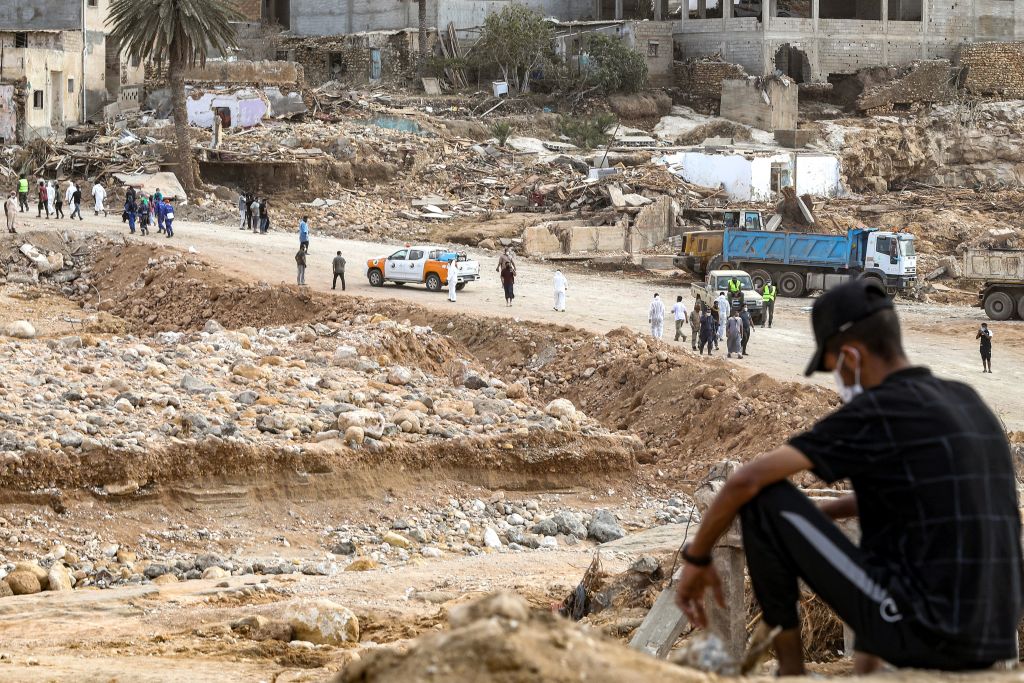Support justice-driven, accurate and transparent news — make a quick donation to Truthout today!
International scientists announced Tuesday that an event like the extreme rain that led to deadly flooding in Libya earlier this month “has become up to 50 times more likely and up to 50% more intense compared to a 1.2°C cooler climate,” or the preindustrial world.
Those were among the findings of a World Weather Attribution (WWA) analysis of torrential rainfall in several countries across the Mediterranean during the first two weeks of September, conducted by researchers from Germany, Greece, the Netherlands, the United Kingdom, and the United States.
“The research is top notch and follows established… rapid attribution principles, grounded in peer-reviewed methods and data that pass highest quality standards,” said Karsten Haustein, a climate scientist at the Leipzig University in Germany not involved with the analysis.
While the storm dubbed Daniel by Greek meteorologists impacted various countries, the African nation of Libya — which has been in chaos since 2011 — was by far the worst affected, largely due to a pair of dams that failed and let floodwaters kill thousands in the city of Derna.
The United Nations Office for the Coordination of Humanitarian Affairs said Saturday that at least 3,958 people were killed and over 9,000 more were still missing. Some groups have reported higher figures, such as the Libyan Red Crescent, which previously put the death toll at 11,300.
Haustein noted that in terms of the death and destruction in Libya, the WWA researchers “discuss a host of confounding factors (long-lasting armed conflict, political instability, potential design flaws and poor maintenance of dams) that have led to an extreme level of vulnerability and exposure. All independent of climate change.”
“Accordingly, they do not speculate about the role of climate change regarding damage and fatalities,” the scientist explained. “Rather they highlight that the lack of early warning action and disaster relief has played a critical role in worsening the destructive outcome. The implications as far as adaptation is concerned are crucially important nonetheless, especially in light of the drastically increased risk for an event like this to happen again within the coming decades (rather than twice a millennium).”
Julie Arrighi, interim director at the Red Cross Red Crescent Climate Center, which had researchers working on the WWA report, said that “this devastating disaster shows how climate change-fueled extreme weather events are combining with human factors to create even bigger impacts, as more people, assets, and infrastructure are exposed and vulnerable to flood risks.”
“However, there are practical solutions that can help us prevent these disasters from becoming routine,” Arrighi stressed, “such as strengthened emergency management, improved impact-based forecasts and warning systems, and infrastructure that is designed for the future climate.”
The WWA team also found that for the region including Greece and parts of Bulgaria and Turkey, human-induced climate change made an extreme event up to 10 times more likely and up to 40% more intense. As the WWA report notes, the flooding led to at least 17 deaths in Greece, seven in Turkey, six in Spain, and four in Bulgaria.
“The worst-affected region in Greece, the Thessaly plain, accounts for over one-quarter of the country’s agricultural production, the report says. “After more than 75,000 hectares were inundated, it is estimated that the agricultural sector in Thessaly will need five years to recover from the damages and for the lands to become fertile again.”
Friederike Otto, a climatologist at the U.K.’s Imperial College London who worked on the WWA analysis, said Tuesday that “the Mediterranean is a hotspot of climate change-fueled hazards.”
“After a summer of devastating heatwaves and wildfires with a very clear climate change fingerprint, quantifying the contribution of global warming to these floods proved more challenging,” Otto added. “But there is absolutely no doubt that reducing vulnerability and increasing resilience to all types of extreme weather is paramount for saving lives in the future.”
The analysis was released on the eve of the United Nations Climate Ambition Summit in New York City — which some world leaders, including U.S. President Joe Biden, have decided to skip despite demands for bold action, particularly from rich nations that are largely responsible for the planetary emergency.
Jagan Chapagain, secretary general of the International Federation of Red Cross and Red Crescent Societies, said Tuesday that “the disaster in Derna is yet another example of what climate change is already doing to our weather.”
“Obviously multiple factors in Libya turned Storm Daniel into a human catastrophe; it wasn’t climate change alone. But climate change did make the storm much more extreme and much more intense and that resulted in the loss of thousands of lives,” Chapagain continued. “That should be a wake-up call for the world to fulfill the commitment on reducing emissions, to ensure climate adaptation funding, and tackle the issues of loss and damage.”
A terrifying moment. We appeal for your support.
In the last weeks, we have witnessed an authoritarian assault on communities in Minnesota and across the nation.
The need for truthful, grassroots reporting is urgent at this cataclysmic historical moment. Yet, Trump-aligned billionaires and other allies have taken over many legacy media outlets — the culmination of a decades-long campaign to place control of the narrative into the hands of the political right.
We refuse to let Trump’s blatant propaganda machine go unchecked. Untethered to corporate ownership or advertisers, Truthout remains fearless in our reporting and our determination to use journalism as a tool for justice.
But we need your help just to fund our basic expenses. Over 80 percent of Truthout’s funding comes from small individual donations from our community of readers, and over a third of our total budget is supported by recurring monthly donors.
Truthout has launched a fundraiser, and we have a goal to add 231 new monthly donors in the next 48 hours. Whether you can make a small monthly donation or a larger one-time gift, Truthout only works with your support.
